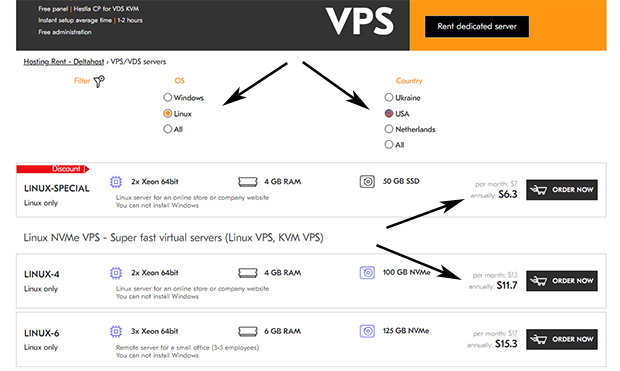Key Features and Benefits of VPS Servers
 First of all, let’s briefly describe the basic principle of how virtual (VPS) servers work. This is a technology that provides the user with a separate “virtual machine” (VPS Server) located within a physical server common to several users. It has a number of advantages and features over other types of hosting, which we will consider today.
First of all, let’s briefly describe the basic principle of how virtual (VPS) servers work. This is a technology that provides the user with a separate “virtual machine” (VPS Server) located within a physical server common to several users. It has a number of advantages and features over other types of hosting, which we will consider today.
Flexibility/Scalability of VPS
Scalability and flexibility are main benefits of VPS servers, which will definitely be appreciated by the owners of a developing business.
- First, users can initially choose the hosting configuration that best suits their current needs.
- Secondly, the user will be able to change/update the parameters of his VPS by switching to other more expensive/powerful rate if necessary with the growth of business processes and the number of clients. For example, traffic volumes of an online store during the initial launch and after its further development can differ significantly.
With regard to configuration flexibility, users can choose the software they need to install on the server + additionally add any other software that suits the server OS. The client has the opportunity to configure the VPS server for their own needs and tasks.
To find out about VPS — how much is the rent? you go to the corresponding page of the host and see the rates that suit you best.

For example, a service like renting a VPS server on Windows OS will cost more than VPS on Linux. Also, the price is affected by the power of the hardware components and the volume of the disk.
Guaranteed dedicated resources and performance levels
VPS can give the user a guaranteed level of performance that clearly exceeds the capabilities of shared hosting. This provides more stable operation of your websites/applications and high performance compared to regular hosting rates.
The VPS has a guaranteed allocation of resources for the processor, RAM, which will not be used by the rest of the clients of this “physical server”. The volume of these resources, as well as the amount of required disk space, you choose from the available tariffs.
Administration and Technical Support
VPS users usually have root level access, which allows them to take full control of their server. As mentioned above, this allows them to install any software and configure a web server to solve their problems.
Here lies another important nuance. Unlike shared hosting, where technical support is provided by your hosting staff, VPS customers are solely responsible for the operation and maintenance of their servers. Therefore, users should have enough knowledge/experience in server administration to solve problems that may arise.
Some hosting providers can additionally give you a paid technical support service or you will have to look for a competent admin in your company.

Reliability and security
VPS server rental provides higher reliability than shared hosting. This is due to the fact that each VPS user is on his own virtual machine and has access only to his own resources. This ensures more stable server operation and less risk of crashes.
Also, users can independently manage the security of their web server by installing the appropriate software, observing the necessary security measures, as well as creating backup copies of data / sites to restore their work in case of emergency.
Price and conclusions
Of course, the cost of a VPS is higher than a shared hosting service. You will have to pay a little more for all the features we talked about above. However, a VPS can be more beneficial in the long run, especially for businesses where security and performance are critical. But we should not forget that in order to effectively use VPS, it is important to have enough knowledge and experience in their administration.
